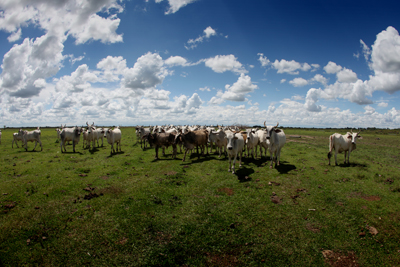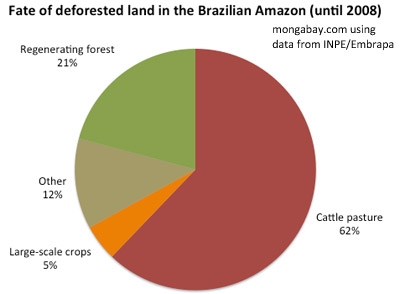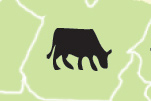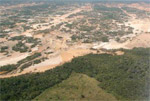In a campaign launched in Italy on Wednesday, Greenpeace accused Brazilian beef giant JBS-Friboi of breaking its commitment to exclude cattle connected with illegal deforestation and slave labor from its supply chain.
Greenpeace says it has uncovered evidence of JBS breaking its 2009 commitment on responsible cattle sourcing. The agreement signed by JBS commits it to avoid buying cattle from properties that have been blacklisted by the Labor Ministry, embargoed by Brazil’s environmental protection agency IBAMA, or are situated within indigenous territories.
Greenpeace says the discovery “demonstrates weaknesses in the supply chain for responsible leather and meat products.”
“Consumers buying products originating from JBS’ supply chain cannot be assured their products are responsibly sourced, meaning not contributing to deforestation and slave labour,” said Greenpeace in Broken Promises: How the cattle industry in the Amazon is still connected to deforestation, slave labour and invasion of indigenous land [PDF], a report launched as part of the campaign.

|
Greenpeace is calling upon JBS to honor its commitment under the 2009 Cattle Agreement signed by other cattle majors. The environmental group wants JBS to sever ties with ranches exposed in its new report and establish a “transparent and efficient” monitoring process for implementation of its commitment. It is also asking JBS and other Brazilian cattle giants to “publicly support strong comprehensive laws that seek to decrease and eliminate deforestation caused by cattle ranching in Brazil.”
Greenpeace chose to launch its campaign at a fashion show in Bologna, Italy. The Italian fashion industry is a high-profile buyer of Brazilian leather, making it an attractive target for activists.
Greenpeace’s cattle campaign began in June 2009 and met immediate success. Within three months of launching the campaign, major supermarkets and shoes companies demanded their suppliers provide them with deforestation-free beef and leather. The major slaughterhouses — including JBS, Bertin, Marfrig, and Minerva — responded by signing the Minimum Criteria for Industrial-Scale Operations With Cattle and Bovine Products in the Amazon Biome Agreement, which commits them to cleaning up their supply chains.
 Fate of deforested land in the Brazilian Amazon until 2008 |
Cattle ranching is the largest driver of deforestation in the Amazon. According to a study published earlier this year by the Brazilian government, more than 60 percent of deforested land in the Brazilian Amazon is used as cattle pasture. Most of this is low-intensity ranching, with less than one head of cattle per hectare. While financial returns from such operations are low, cattle ranching is often used as a vehicle for land speculation. Forestland has little value—but cleared pastureland can be used to produce cattle or sold to large-scale farmers.
Related articles
62% of deforested Amazon land ends up as cattle pasture
(09/04/2011) 62 percent of the area deforested in the Brazilian Amazon until 2008 is occupied by cattle pasture, reports a new satellite-based analysis by Brazil’s National Institute for Space Research (INPE) and its Agricultural Research Corporation (Embrapa).
Can Brazil meet deforestation, climate goals and still grow its cattle industry?

(06/09/2011) Despite environmentalists’ efforts to combat “rainforest beef” in the 1980s, pasture expansion for cattle is still the primary cause of deforestation in the Brazilian Amazon, says a new report produced by Brighter Green. While Brazil’s investments in agribusiness have made it an agricultural powerhouse—the country is now the world’s third-largest exporter of farm commodities after the US and the European Union—unfortunately, two of the Brazil’s key products, cattle and soy, are still driving deforestation as well as economic growth. According to Brighter Green’s report, researchers estimate that cattle ranching caused 65-70 percent of land clearing in the Amazon between 2000 and 2005.
Brazil’s forest code debate may determine fate of the Amazon rainforest
(05/05/2011) Brazil’s forest code may be about to get an overhaul. The federal code, which presently requires landowners in the Amazon to keep 80 percent of their land forest (20-35% in the cerrado), is widely flouted, but has been used in recent years as a lever by the government to go after deforesters. For example, the forest code served as the basis for the “blacklists” which restricted funds for municipalities where deforestation has been particularly high. To get off the blacklist, and thereby regain access to finance and markets, a municipality must demonstrate its landowners are in compliance with environmental laws.
World’s largest beef company signs Amazon rainforest pact

(04/29/2011) The world’s largest meat processor has agreed to stop buying beef from ranches associated with slave labor and illegal deforestation in the Brazilian Amazon, according to the public prosecutor’s office in the state of Acre. The deal absolves JBS-Friboi from 2 billion reals ($1.3 billion) in potential fines and paves the way for the firm to continue selling meat to companies concerned about their environmental reputation.
Deforestation gives some Brazil beef a big carbon footprint
(03/08/2011) Extensive deforestation for low-yielding cattle production means some Brazilian beef carries a disproportionately high carbon footprint, reports a new study published in Environmental Science & Technology.
Corporations, conservation, and the green movement

(10/21/2010) The image of rainforests being torn down by giant bulldozers, felled by chainsaw-wielding loggers, and torched by large-scale developers has never been more poignant. Corporations have today replaced small-scale farmers as the prime drivers of deforestation, a shift that has critical implications for conservation. Until recently deforestation has been driven mostly by poverty—poor people in developing countries clearing forests or depleting other natural resources as they struggle to feed their families. Government policies in the ’60s, ’70s, and ’80s had a multiplier effect, subsidizing agricultural expansion through low-interest loans, infrastructure projects, and ambitious colonization schemes, especially in the Amazon and Indonesia. But over the past two decades, this has changed in many countries due to rural depopulation, a decline in state-sponsored development projects, the rise of globalized financial markets, and a worldwide commodity boom. Deforestation, overfishing, and other forms of environmental degradation are now primarily the result of corporations feeding demand from international consumers. While industrial actors exploit resources more efficiently and cause widespread environmental damage, they also are more sensitive to pressure from consumers and environmental groups. Thus in recent years, it has become easier—and more ethical—for green groups to go after corporations than after poor farmers.
Walmart takes on Amazon deforestation
(10/18/2010) The world’s largest retailer last week announced new sourcing criteria for commodities closely associated with deforestation: palm oil and beef from the Amazon.
Deforestation-free leather comes closer to reality in the Brazilian Amazon
(05/02/2010) Prominent leather buyers have developed a new traceability system to ensure that leather products from Brazil don’t result in deforestation, reports the National Wildlife Federation, an NGO working to improve the environmental performance of the cattle industry in the Amazon.
Brazilian cattle giants move toward zero deforestation in the Amazon
(04/07/2010) Brazilian cattle companies are making progress in their effort to map their supply-chains in the Amazon but are still falling short of their commitment to zero deforestation in the region, reports Greenpeace after a meeting at the Brazilian Association of Meat Exporters (ABIEC) in Sao Paulo.
Amazon cattle ranching accounts for half of Brazil’s CO2 emissions
(12/12/2009) Cattle ranching accounts for half of Brazil’s greenhouse gas emissions according to a new study led by scientists from Brazil’s National Space Institute for Space Research (INPE).
Concerns over deforestation may drive new approach to cattle ranching in the Amazon

(09/08/2009) While you’re browsing the mall for running shoes, the Amazon rainforest is probably the farthest thing from your mind. Perhaps it shouldn’t be. The globalization of commodity supply chains has created links between consumer products and distant ecosystems like the Amazon. Shoes sold in downtown Manhattan may have been assembled in Vietnam using leather supplied from a Brazilian processor that subcontracted to a rancher in the Amazon. But while demand for these products is currently driving environmental degradation, this connection may also hold the key to slowing the destruction of Earth’s largest rainforest.
Activists target Brazil’s largest driver of deforestation: cattle ranching

(09/08/2009) Perhaps unexpectedly for a group with roots in confrontational activism, Amigos da Terra – Amazônia Brasileira is calling for a rather pragmatic approach to address to cattle ranching, the largest driver of deforestation in the Brazilian Amazon. The solution, says Roberto Smeraldi, founder and director of Amigos da Terra, involves improving the productivity of cattle ranching, thereby allowing forest to recover without sacrificing jobs or income; establishing a moratorium on new clearing; and recognizing the economic values of maintaining the ecological functions of Earth’s largest rainforest.
Brazilian beef giant announces moratorium on rainforest beef

(08/13/2009) Brazil’s second-largest beef exporter, Bertin, announced it would establish a moratorium on buying cattle from farms involved in Amazon deforestation, reports Greenpeace. The move comes after the World Bank’s International Finance Corporation (IFC) withdrew a $90 million loan to Bertin following revelations in a Greenpeace report that the company was buying beef produced on illegally deforested lands. The report, which linked some of the world’s most prominent brands to rainforest destruction in the Amazon, had an immediate impact, triggering a cascade of events.
Nike implements policy to avoid leather produced via Amazon deforestation
(07/22/2009) Nike is working with Greenpeace to ensure its products don’t contribute to destruction of the Amazon rainforest, according to statements from the shoe giant and the environmental activist group. The partnership comes after Greenpeace report accused Nike of using leather derived from cattle raised on illegal deforested Amazon land. The report, “Slaughtering the Amazon”, also linked other shoemakers to rainforest destruction, including Adidas, Reebok and Timberland.
Brazil’s development bank to require beef-tracking system to avoid illegal Amazon deforestation
(07/01/2009) Responding to allegations that major Brazilian cattle producers are responsible for illegal forest clearing in the Amazon, Brazil’s development bank BNDES will soon require processors to trace the origin of beef back to the ranch where it was produced in order to qualify for loans, reports Brazil’s Agencia Estado. The traceability program aims to ensure that cattle products do not come from illegally deforested land.
World Bank revokes loan to Brazilian cattle giant accused of Amazon deforestation

(06/13/2009) The Work Bank’s private lending arm has withdrawn a $90 million loan to Brazilian cattle giant Bertin, following Greenpeace’s release of a report linking Bertin to illegal deforestation of the Amazon rainforest, report environmental groups, Friends of the Earth-Brazil and Greenpeace. The loan, granted by the International Finance Corporation (IFC) in March 2007, was to expand Bertin’s meat-processing in the Brazilian Amazon. At the time, the IFC promoted the loan as a way to promote environmentally responsible beef production in the Amazon, although environmental groups — including Friends of the Earth-Brazil and Greenpeace — criticized the move.
Wal-Mart bans beef illegally produced in the Amazon rainforest

(06/12/2009) Brazil’s three largest supermarket chains, Wal-Mart, Carrefour and Pão de Açúcar, will suspend contracts with suppliers found to be involved in Amazon deforestation, reports O Globo. The decision, announced at a meeting of the Brazilian Association of Supermarkets (Abras) this week, comes less than two weeks after Greenpeace’s exposé of the Amazon cattle industry. The report, titled Slaughtering the Amazon, linked some of the world’s most prominent brands — including Nike, Toyota, Carrefour, Wal-Mart, and Johnson & Johnson, among dozens of others — to destruction of the Amazon rainforest for cattle pasture.
Nike, Unilever, Burger King, IKEA may unwittingly contribute to Amazon destruction, says Greenpeace

(06/01/2009) Major international companies are unwittingly driving the deforestation of the Amazon rainforest through their purchases of leather, beef and other products supplied from the Brazil cattle industry, alleges a new report from Greenpeace. The report, Slaughtering the Amazon, is based on a three-year undercover investigation of the Brazilian cattle industry, which accounts for 80 percent of Amazon deforestation and roughly 14 percent of the world’s annual forest loss. Greenpeace found that Brazilian beef companies are important suppliers of raw materials used by leading global brands, including Adidas/Reebok, Nike, Carrefour, Eurostar, Unilever, Johnson & Johnson, Toyota, Honda, Gucci, Louis Vuitton, Prada, IKEA, Kraft, Tesco and Wal-Mart, among others.














